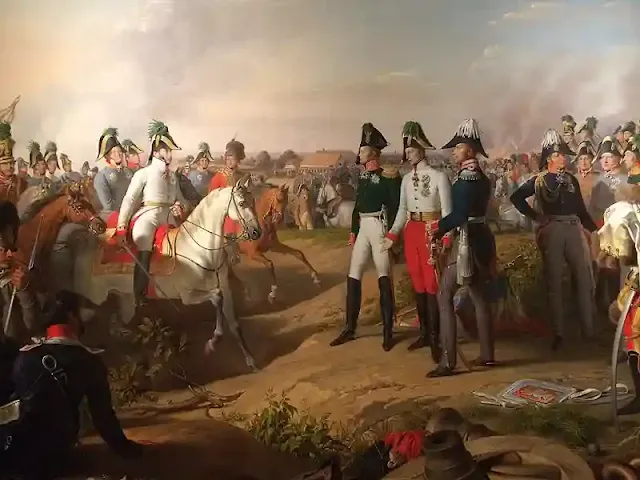The Sixth Coalition: Exiling Napoleon Bonarte
Napoleon Bonaparte, also known as Napoleon I, a name that resounds in history, was a brilliant military strategist, political figure, and emperor who made a lasting impact on Europe. He became famous during the French Revolution and achieved victories during the Revolutionary Wars. He governed France as the First Consul from 1799 to 1804 and then as the Emperor from 1804 to 1814, with a short-term returns in 1815.
Even today, people discuss his legacy. Some view him as a great leader, while others have reservations about his actions. Napoleon implemented significant changes and is regarded as one of the greatest military commanders in history. The battles he fought are still part of the curriculum in military schools worldwide. Regrettably, a substantial number of people, including both soldiers and civilians, lost their lives during the Napoleonic Wars, with estimates ranging from three to six million casualties.
 |
| Image Source: Google, Napoleon Bonaparte |
His journey to authority and eventual exile is an intriguing story that still captivates scholars and fans. The Sixth Coalition was a strong alliance created by various European nations with a shared aim: to defeat and remove the influential Napoleon Bonaparte from power. This article explores how the coalition came together, the key events leading to Napoleon's exile, and the aftermath of his downfall.
💻 Table of Contents:
Early Life and Rise of Power:
Napoleon Bonaparte was born on August 15, 1769, in the town of Ajaccio on the island of Corsica, which was part of France at the time. He came from an Italian Origin family. In 1785, he graduated from a French military academy and began his military career as a second lieutenant in an artillery regiment. The French Revolution began in 1789, and it brought about significant political and social changes in France. During the early years of the revolution, Napoleon was not actively engaged in military matters. He spent time in Corsica and became associated with the Jacobins, a political group.
However, in 1793, due to a conflict with the Corsican governor, Pasquale Paoli, Napoleon's family left Corsica for mainland France, and Napoleon returned to active military duty. In France, Napoleon got close to Augustin Robespierre, who was the brother of Maximilien Robespierre, a key leader during the Reign of Terror, a violent time during the revolution. During this period, Napoleon became a Brigadier General in the army. But after Maximilien and Augustin were executed in July 1794, Napoleon was temporarily put under house arrest because of his connection to them.
In 1795, Napoleon helped stop a royalist uprising against the revolutionary government in Paris and was promoted to the rank of Major General. A "royalist uprising" refers to a revolt or rebellion led by individuals or groups who supported the return of a monarchy or the restoration of a royal ruler. In the context of the French Revolution, a royalist uprising would have involved those who were in favor of bringing back the monarchy, which had been abolished during the revolution, and restoring a king to power. The royalists were often opposed to the revolutionary republican government that had replaced the monarchy.
💻 You May Also Like:
Since 1792, France's revolutionary government had been in conflicts with various European nations. In 1796, Napoleon led a French army that defeated the larger Austrian armies in a series of battles in Italy, one of France's main rivals. In 1797, France and Austria signed the Treaty of Campo Formio, which gave more land to France.
The next year, the Directory, the group governing France since 1795, asked Napoleon to invade England, but he felt the French navy wasn't strong enough to face the powerful British Royal Navy. Instead, he suggested invading Egypt to dislocate British trade with India. His troops won a battle against Egypt's rulers, the Mamluks, in July 1798, but his navy was almost destroyed by the British at the Battle of the Nile in August 1798. In early 1799, Napoleon's army invaded Ottoman Empire-ruled Syria, but the campaign ended with a failed siege of Acre in modern-day Israel. In that uncertain political climate, Napoleon decided to leave his army in Egypt and return to France.
Napoleon's early military successes and his ambition to rise to a higher political position would ultimately lead to his involvement in the coup of 18 Brumaire in November 1799, which marked the end of the French Directory and the beginning of the Consulate. This event pushed him to the position of First Consul, making him the most influential figure in France and setting the stage for his later declaration as Emperor of France in 1804.
The Napoleonic Era:
Between 1803 and 1815, France participated in the Napoleonic Wars, a series of significant conflicts involving various European coalitions. In 1803, partly to raise funds for future wars, Napoleon sold France's Louisiana Territory in North America to the newly independent United States for $15 million, known as the Louisiana Purchase.
In October 1805, the British defeated Napoleon's fleet at the Battle of Trafalgar. However, in December of the same year, Napoleon achieved one of his greatest victories at the Battle of Austerlitz, defeating the Austrians and Russians. This led to the dissolution of the Holy Roman Empire and the creation of the Confederation of the Rhine.
Starting in 1806, Napoleon aimed to harm the British economy through the Continental System, which imposed blockades on British trade using European ports. In 1807, after Napoleon defeated the Russians at Friedland in Prussia, Alexander I was forced to sign a peace treaty known as the Treaty of Tilsit. In 1809, the French defeated the Austrians at the Battle of Wagram, resulting in more territorial gains.
During this time, Napoleon reestablished a French aristocracy, which had been abolished during the French Revolution. He granted titles of nobility to loyal friends and family as his empire expanded across much of western and central continental Europe.
 |
| Image Source: Googl, Battle of Leipzig |
The French Invasion of Russia:
In 1810, Russia left the Continental System. So, in the summer of 1812, Napoleon led a big army into Russia. The campaign's official political objective was to free Poland from the so-called threat posed by Russia. But the Russians didn't fight a big battle. Instead, they kept moving away whenever Napoleon's army tried to attack. This made Napoleon's troops go deeper into Russia, even though they weren't ready for a long campaign.
In September 1812, they had a battle called Borodino, where both sides had heavy losses, but it didn't decide who won. Napoleon's army then marched to Moscow, but they found the city nearly empty. The retreating Russians had set fires in the city to stop the French army from getting supplies. After waiting for a month for the Russians to give up, Napoleon had to order his starving and tired army to leave Moscow because winter was coming. During the tough withdrawal, his army was constantly attacked by the Russian army. Napoleon's invasion of Russia is renowned as one of the most extensively studied military campaigns in history and stands out as one of the deadliest military operations ever recorded. It's marked by a staggering human cost, with nearly a million soldiers and civilians died in less than six months.
At the same time as this disaster in Russia, the French were also fighting in the Peninsular War from 1808 to 1814. In this war, the Spanish and Portuguese, with help from the British, kicked the French out of the Iberian Peninsula. In 1813, there was the Battle of Leipzig, where Napoleon's army was beaten by a coalition of Austrian, Prussian, Russian, and Swedish troops. After that, Napoleon had to go back to France.
The Formation of the Sixth Coalition:
In the aftermath of Napoleon's unsuccessful Russian campaign in 1812, his influence began to diminish. In 1813, Prussia, Russia, the United Kingdom, Austria, Sweden, Portugal, Spain, Sardinia (part of modern Italy), and several German states joined forces in a strategic alliance called the Sixth Coalition.
This coalition emerged as an opportunity to curtail Napoleon's power and influence. Notably, the conflict that ensued, known as the War of the Sixth Coalition, was also referred to as the Wars of Liberation within Germany. Their primary objective was to free Europe from Napoleon's rule and restore the balance of power across the continent. The Sixth Coalition achieved success against the Napoleonic regime, underscoring its historical significance.
 |
| Image Source: Google, Napoleon Returned |
Europe Unites: The Formation of Anti-Napoleon Alliances
During the Napoleonic Wars, several coalitions were formed to oppose Napoleon Bonaparte's dominance in Europe. The Sixth Coalition was the alliance specifically formed against him. To understand its significance, let's briefly look at the previous coalitions. The First Coalition (1793-1797) was created in response to the French Revolution and included Austria, Prussia, Great Britain, Spain, and others.
💻 You May Also Like:
The Second Coalition (1798-1802) formed after Napoleon's successful campaigns, involving Austria, Russia, Great Britain, and the Ottoman Empire. The Third Coalition (1805) emerged to counter Napoleon's European ambitions and included Austria, Russia, Great Britain, and Sweden.
The Fourth Coalition (1806-1807) came together after Napoleon's victory at Austerlitz and consisted of Prussia, Russia, Saxony, and Sweden. The Fifth Coalition (1809) arose after Austria's defeat and involved Austria, the United Kingdom, and Spain.
With Napoleon's power and influence still intact, the European powers formed the Sixth Coalition in 1813 to continue their efforts to defeat him. This coalition included Austria, Prussia, Russia, the United Kingdom, and several other European states. The Sixth Coalition ultimately proved successful in defeating Napoleon in 1814 and 1815, leading to his first exile on the island of Elba and subsequent final defeat at the Battle of Waterloo.
The numbering of the coalitions simply reflects the sequence in which they were formed to oppose Napoleon's rule, with each coalition representing a distinct period of resistance against his dominance in Europe.
 |
| Image Source: Google, Battle of Waterloo |
The War of the Sixthe Coalition and the Fall of Paris:
The War of the Sixth Coalition witnessed a series of major battles and campaigns that marked the turning point in Napoleon's reign. The coalition forces, bolstered by their determination and the desire to end French dominance, achieved significant victories over Napoleon's armies in battles such as Leipzig, also known as the Battle of Nations, in October 1813. This battle proved crucial in weakening Napoleon's military strength.
After a reassessment by Tsar Alexander I of Russia and King Frederick of Prussia, along with their advisers, they realized their opponent's weakness and chose to advance toward Paris. The conflict concluded with the French commanders surrendering the city to Tsar Alexander on March 31, 1814. As the coalition forces closed in on Paris, Napoleon's grip on power began to crumble. In March 1814, Paris fell to the coalition, and Napoleon was forced to abdicate the throne. He was exiled to the island of Elba, and the Bourbon monarchy was restored in France.
The Hundred Days Campaign & Battle of Waterloo:
Napoleon's exile on Elba was short-lived. On February 26, 1815, Napoleon escaped from exile in Elba with over 1,000 followers and sailed to the French mainland. He returned to Paris on March 20, 1815 greeted by enthusiastic crowds. King Louis XVIII escaped, and Napoleon initiated his Hundred Days campaign. His return sparked renewed conflict with the coalition powers.
On June 18, 1815, the Battle of Waterloo took place near Waterloo, which was part of the United Kingdom of the Netherlands (now in Belgium). This battle marked the conclusion of the Napoleonic Wars. Napoleon led the French army but was defeated by two armies from the Seventh Coalition. Napoleon's defeat at Waterloo marked the end of his reign and sealed his fate. The battle was called the Battle of Mont Saint-Jean in France and La Belle Alliance ("the Beautiful Alliance") in Prussia.
After his defeat at Waterloo, Napoleon faced another exile, this time to the remote Saint Helena Island in the South Atlantic. Confined to this isolated island, he spent the remaining years of his life reflecting on his eventful reign and dictating his life story.
Conclusion:
The establishment of the Sixth Coalition and its following triumphs against Napoleon Bonaparte signified a pivotal moment in European history. This union of formidable nations managed to overthrow one of history's most influential figures. Napoleon's exile to Elba, his brief return during the Hundred Days, and his ultimate defeat at Waterloo ultimately resulted in his exile on the remote island of Saint Helena.
The legacy of the Sixth Coalition and the exile of Napoleon Bonaparte stand as a reminder of the importance of collective action and the effect of individual ambition on the course of history.





.webp)